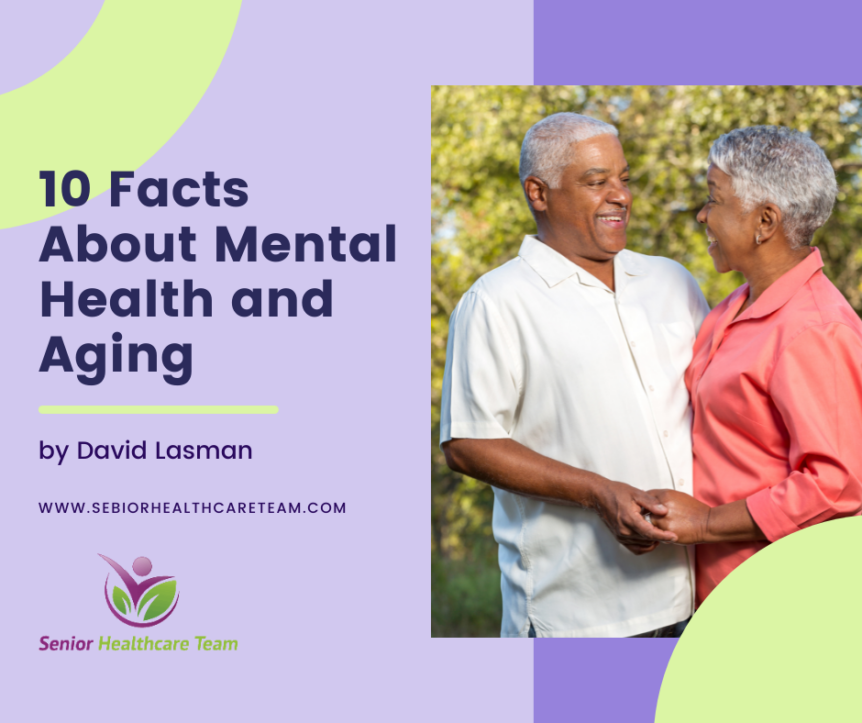As many as one in five older adults experience mental health concerns that are not a normal part of aging – the most common of which are anxiety or mood disorders including depression. In most cases, these mental health issues respond well to treatment. Sadly, far too often older adults do not seek or receive the help they need. Undiagnosed and untreated, mental health illnesses have serious implications for older adults and their loved ones. That’s why it’s important to understand these “10 Facts You Need to Know About Mental Health and Aging.”
Mental health problems are not a normal part of aging.
While older adults may experience many losses, deep sadness that lingers may signal clinical depression. Similarly, an anxiety disorder is different from normal worries.
- One in four American adults has a diagnosable mental disorder during any one year.
- About six percent of older adults have a diagnosable depressive illness.
Mental health is as important as physical health.

Good mental health contributes greatly to an overall feeling of well-being. Untreated mental health disorders in older adults can lead to diminished functioning, substance abuse, poor quality of life, and increased mortality. Research shows mental illness can slow healing from physical illnesses.
Healthy older adults can continue to thrive, grow, and enjoy life!
Reading, walking, and socializing are just a few of the activities that many individuals enjoy at any age. Exercising your mind and body, and maintaining social connections are good for your mental health, too.
Mental health problems are a risk for older adults, regardless of history.
While some adults go through life managing a chronic mental illness, mental health problems can also appear late in life. Sometimes mental health deteriorates in response to a stroke, Parkinson’s disease, cancer, arthritis, or diabetes, and even some medications. Older adults without a history of substance abuse may abuse medications, alcohol, or drugs.
Suicide is a risk among older adults.
Older adults have the highest suicide rate in the country.
- Those aged 85 and over have the highest suicide rate; those aged 75 to 84 have the second highest.
- Older adults’ suicide attempts are more lethal. For those 65 and older, there is one suicide for every four attempts compared to one suicide for every 20 attempts for all other age groups.
These symptoms call for consultation with a health care professional:
- Sadness that has lasted longer than two weeks.
- Consistent worries about issues such as money, family and health.
- Consistent trouble sleeping or concentrating
- Frequent trouble remembering things or feeling confused in familiar places
- Have more than one alcoholic drink a day or take more medication than prescribed.
Older adults can be helped with the same success as younger people.
Eighty percent of older adults recovered from depression after receiving treatment that included both psychotherapy and anti-depressant medication.
Our health system is not adequately helping older adults with mental disorders.
Medicare covers 80 percent of a physical health problem, but only 50 percent of a mental health problem. This is a barrier to treatment for many people.
- Researchers estimate that up to 63 percent of older adults with a mental disorder do not receive the services they need.
- 75 percent of those who commit suicide have visited a primary care physician within a month of their suicide.
Misdiagnosis and avoidance are common.
- Primary care physicians fail to diagnose depression 50 percent of the time.
- Only half of older adults who discuss specific mental health problems with a physician receive any treatment.
Older adults have unique mental health care needs.
Changing bodies and chemistry, changes in family and friendships, and changes in living situations all have an effect on mental health and need to be considered in treatment.
Sometimes helping solve basic problems, like transportation, can lower stress, improve community connections, and improve outlook and mood.
If older adults take several medications for a variety of illnesses, drug interactions and side effects can affect mood and behavior.
By David Lasman – “Ask Medicare Dave” | President – Senior Healthcare Team
wwww.SeniorHealthcareTeam.com | 866-333-7340
Selecting the right healthcare plan through Medicare can be overwhelming and downright stressful. Senior Healthcare Team is a nationwide resource that provides guidance and support about Medicare to seniors at no cost to them and helps them to choose the most suitable insurance plan tailored to their specific needs and budget. Our goal is to educate and empower our clients to make the best decisions regarding their healthcare and clear up the confusion of Medicare. At Senior Healthcare Team, we aren’t partial to any one insurance company. Our loyalty is to our clients and our mission is to provide them with the best healthcare options at the very lowest cost.

